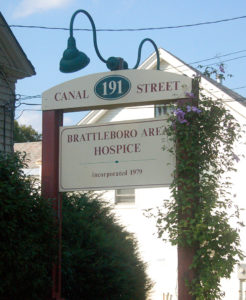Our History
 Brattleboro Area Hospice was founded in 1979 by a group of community members concerned that their dying and grieving neighbors receive compassionate, appropriate assistance. Since then we have become an integral part of our community and a key contributor to what makes it a special place to live.
Brattleboro Area Hospice was founded in 1979 by a group of community members concerned that their dying and grieving neighbors receive compassionate, appropriate assistance. Since then we have become an integral part of our community and a key contributor to what makes it a special place to live.
For the first three years, Brattleboro Area Hospice was an all-volunteer organization and in 1982 hired its first paid employee. In 1988, two board members started the Experienced Goods Thrift Shop which allowed the organization to hire more staff and expand services. In 1999, the current office building on Canal Street was purchased through the generous donations of community members and the Thomas Thompson Trust.
We are now one of less than 200 volunteer hospices left in the United States. Although the hospice movement in this country was originally volunteer-focused, today many agencies offer complex medical services while neglecting the crucial role of the volunteer. However, the compassionate assistance of neighbors helping neighbors in this difficult time cannot be underestimated and Brattleboro Area Hospice remains dedicated to the belief that each of us can be a companion to those who are facing the challenging journey of terminal illness or grief.
Awards
In May 1999, BAH won one of two Brattleboro Pastoral Counseling Center Humanitarian Awards, which stated, “your organization’s selfless giving in a quiet unassuming way in a variety of activities is worthy of our acknowledgment.” This is the first time a group, rather than an individual, won this award.
In September of 1994, BAH won one of 32 National Awards of Excellence awarded by the National Hospice Organization for our community education efforts. In 1992, BAH won the Vermonters in Volunteer Administration Award for Program Excellence.
A Brief History of Hospice
 The hospice movement was founded on the belief that no one should die alone. As the 20th century progressed, the advent of technological advancements was a double edged sword: amazing innovations in medicine saved lives but also increased the number of people dying alone in hospitals surrounded by machines.
The hospice movement was founded on the belief that no one should die alone. As the 20th century progressed, the advent of technological advancements was a double edged sword: amazing innovations in medicine saved lives but also increased the number of people dying alone in hospitals surrounded by machines.
Hospice philosophy affirms that as long as there is life, there are physical, social, spiritual and emotional needs that can be addressed. The word “hospice” comes from the Latin word “hospes” meaning to host a guest or stranger and can be traced back to early Western Civilization when it was used to describe a place of shelter and rest for weary or sick travelers on long journeys.
“Hospice” was first applied to the care of dying patients by the founder of the Dames de Calaire, Mme Jeanne Garnier, in Lyon, France, in 1842. The Irish Sisters of Charity opened Our Lady’s Hospice in Dublin in 1879 and St. Joseph’s Hospice in Hackney, London in 1905.
The modern hospice movement took root in the work of Dame Cicely Saunders who founded St. Christopher’s Hospice in London in 1967. Saunders, a former nurse, was inspired by a patient named David Tasma whom she met in 1948 when he was hospitalized with an inoperable cancer while she was working as a medical social worker. The first hospice in the United States was established in New Haven, Connecticut in 1970, and was modeled after the St. Christopher Hospice. In 1983, the U.S. federal government endorsed hospice care through Medicare legislation.
Much of hospice philosophy is based on the work of Dr. Elisabeth Kubler-Ross, whose model commonly known as The Five Stages of Grief, is a theory first introduced in her book On Death and Dying. This book was inspired by her work with terminally ill patients and has been credited with “bringing death out of the darkness.”
Though Kubler-Ross’s theory was originally based on the terminally ill, she realized that the theory could be used for anyone experiencing a loss or bereavement, and The Five Stages of Grief have now become widely accepted. Kubler-Ross’s exploration of ways to improve the process of dying, considering the needs of patients, has aided in the growth of palliative medicine and revolutionized how the medical field takes care of the terminally ill.

